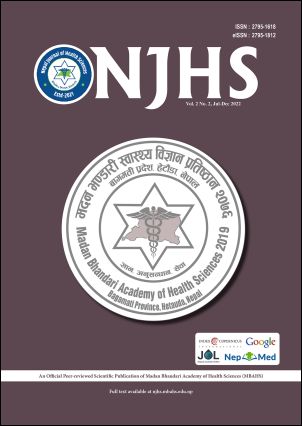Invitro Activity of Tigecycline against Multidrug-Resistant Enterobacteriaceae from Blood Stream Infection at a Tertiary Care Hospital of Nepal
DOI:
https://doi.org/10.3126/njhs.v2i2.56788Keywords:
Enterobacteriaceae, Extended-spectrum beta lactamase, metallo-beta lactamase, multidrug resistant, tigecyclineAbstract
Introduction: Any bacterial isolates showing resistant to three or more than three different types of antimicrobial groups are termed as multidrug resistant. Such superbugs have shown significant challenge not only to microbiologist but also to clinicians. Multidrug resistant like extended-spectrum and metallo-beta lactamase are being encountered as the causative agents of blood stream infection. Accurate diagnosis of blood stream infection, timely isolation and identification of the causative agents and determination of their antimicrobial susceptibility are crucial, as effective management depends on the selection and timely administration of the most appropriate antimicrobial agent.
Objectives: This study is aimed to find out the efficacy of tigecycline against multidrug resistance enterobacteriaceae.
Methods: A descriptive cross-sectional study was conducted in the Department of Microbiology, BP Koirala Institute of Health Sciences, from 1st September 2014 to 31st August 2015. Confirmation for ESBL was done as recommended by Clinical and Laboratory Standard Institute (CLSI) and MBL production was detected by double disk synergy test. Antibiotic sensitivity test against tigecycline was done by Kirby-Bauer disk diffusion method.
Results: 98.96% of multidrug resistant enterobacteriaceae were sensitive against tigecycline. None of the isolates were resistant against tigecycline and only 1.04% of the isolates showed intermediate susceptibility. A total of 64 (33.4%) isolates were found to be multidrug resistant.
Conclusion: Tigecycline is found to have excellent invitro activity against MDR enterobacteriaceae from blood stream infection.





